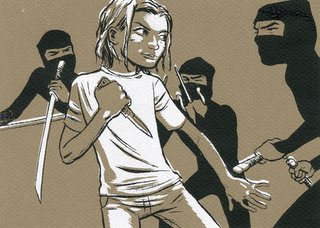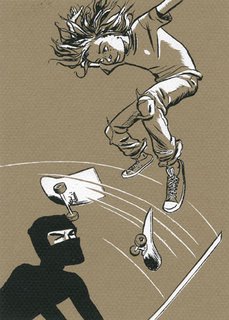Q&A with Jim Rugg

As I mentioned earlier, I recently had the opportunity to interview "Street Angel" artist/co-creator Jim Rugg for a preview story about the signing at Riot. Unfortunately, I was only able to use a wee little bit of our email conversation in the article. It seemed a shame to waste it, as Rugg offered what I thought was some rather interesting insights into the creation of the character. So, with that in mind, here's a slightly edited version of our email conversation. Let's hope more issues of "Angel" are indeed on the way soon.
Q: First of all, tell me a little bit about yourself. Where are you from and where are you living now?
RUGG: I grew up about an hour south of Pittsburgh in a place called Connellsville. I graduated from Indiana University of Pennsylvania in 1999 with a BFA in Graphic Design. Now I live about 10 minutes north of Pittsburgh.
Q: How did you get interested in comics and what made you want to become a cartoonist?
RUGG: Growing up, I always liked to draw. When I was 11 or 12, I randomly picked up a comic book at the local drug store and something just clicked. I knew instantly that’s what I wanted to do, and I never wavered.
Q: What comic was it and what was it about it that captivated you so?
RUGG: The interesting thing about that comic is that it was a horrible comic. It was a random issue of Marvel Comics Presents, this biweekly anthology that Marvel published in the late 80s/early 90s. The issue I bought had a short Hulk story in it. I think that’s why I bought it. I liked the Hulk. But the thing is, the comic wasn’t good, and I still recognized something in it that attracted me to the form. Most of my drawings up to that point were line drawings. As soon as I had the book at home, I think I started copying drawings from it. So it wasn’t some great art or story that drew me to comics, it was just the form itself. Does that make sense?
Q: Where did you get the idea for Street Angel?
RUGG: It’s been a few years since Brian (Maruca, Street Angel’s co-creator) and I came up with Street Angel. Brian’s been co-writing stories with me for a while now, and at the time, I wanted to draw a super hero comic that starred a young, dynamic heroine.
 We brainstormed for a while, trying to come up with something that entertained both of us enough to sustain the creative process and what we ended up with is Street Angel. She began as a parody of Marvel/DC superheroes. A lot of the parody fell away as we progressed through the writing of the first story. What remained was a character that embodied the opposite of most Marvel/DC heroes, instead of an affluent, adult, glamorous male, we ended up with an underdeveloped, immature, not particularly bright, homeless girl.
We brainstormed for a while, trying to come up with something that entertained both of us enough to sustain the creative process and what we ended up with is Street Angel. She began as a parody of Marvel/DC superheroes. A lot of the parody fell away as we progressed through the writing of the first story. What remained was a character that embodied the opposite of most Marvel/DC heroes, instead of an affluent, adult, glamorous male, we ended up with an underdeveloped, immature, not particularly bright, homeless girl.Q: One of the things I find interesting about Street Angel is the way it contrasts its high flights of humor/action/fantasy with its rather touching and sorrowful look at life on the streets. Was that a deliberate contrast or was it something that came about organically?
RUGG: Early in the development of the character and book, we tried to go in the opposite direction of the Marvel/DC male fantasy formula. One element of that was the homelessness and poverty. We wanted to create this character that no one would envy.
As we worked more on the book and the silly humor became more pronounced, we thought the pitiful aspects of the character and her situation served as a counterpoint to the humor/adventure and created a very effective contrast to that aspect of the book. I don’t think it was ever forced.
Issue 4, the story of her searching through dumpsters looking for something to eat was one of the first stories we wrote about her. It’s so typical for a protagonist to be smart, cunning, funny, etc. and with Jesse, that’s not the case. She’s not very bright; she’s uneducated and too immature to recognize the value of education. She’s awkward for a teenage girl, despite her skateboarding and kung fu skills. She’s self-conscious because she has no support group and she’s well aware of her shortcomings – physically and socially.
When she does manage to be funny, it’s often in spite of herself – either the humor comes at her expense or its inadvertent. So the more dire aspects of her and her situation developed as part of her character. I don’t think we’ve done anything with the character that doesn’t make sense.
Q: How has Street Angel been received so far? Is the book doing well?
RUGG: It has been very well received. It has sold well and it has been well reviewed. We’ve received a lot of great feedback from readers at shows and through email. In many ways, it exceeded my expectations.
Q: What are your plans to continue the series? Are there going to be more adventures of Street Angel?
RUGG: I’m not sure what the future holds for Street Angel. I’d like to do more, but I need to make time. Producing a comic book requires a significant commitment. So we’ll see.
Q: What are you working on now?
RUGG: I have no idea. I’m in the middle of a pretty discouraging creative block.
Q: What do you do when you're not making comics (i.e. other art work, hobbies, possible day job, etc)?
RUGG: I work as a graphic designer for a manufacturing/engineering company. I design ads, catalogs, that sort of thing. I also do a little freelance illustration when the opportunity presents itself. When I’m doing neither comics nor the day job, I try to spend time with my wife.


0 Comments:
Post a Comment
<< Home